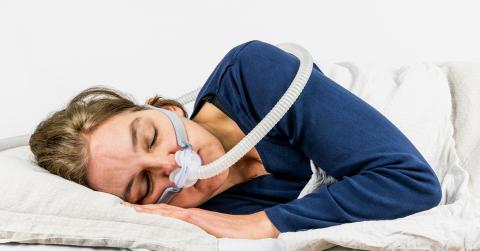Researchers Identify Risk Factors for Sleep Apnea During Pregnancy

Photo: Per-Boge/Thinkstock
Snoring, older age and obesity may increase a pregnant woman’s risk for sleep apnea—or interrupted breathing during sleep—according to researchers funded by NICHD and NHLBI. The study appears in the American Journal of Obstetrics and Gynecology.
“Our study found an easy, inexpensive way to screen large numbers of women at higher risk of sleep apnea during pregnancy,” said study co-author Dr. Uma Reddy of NICHD’s Pregnancy and Perinatology Branch. “Right now, this means we’ll be able to rapidly identify women who may benefit from further testing. Depending on what we learn from future studies, our findings could also lead to improvements in pregnancy outcomes.”
In an earlier study of first-time pregnancies, the researchers found that sleep apnea increases a woman’s risk for hypertensive disorders and gestational diabetes. Currently, there are no medical guidelines or treatment recommendations for sleep apnea during pregnancy. NIH currently supports a study of potential treatments for pregnancy-related sleep apnea and is planning a larger one to be conducted by the NICHD-funded Maternal-Fetal Medicine Units Network.
In the current study, participants responded to questionnaires about their sleep habits, snoring and daytime sleepiness in early pregnancy (6 to 15 weeks) and mid-pregnancy (22 to 29 weeks). The women also underwent sleep apnea testing using an at-home monitoring device.
Researchers found that 3.6 percent of 3,264 women in early pregnancy and 8.3 percent of 2,512 women in mid-pregnancy had sleep apnea. Risk factors for having the condition included frequent snoring (3 or more nights per week), older maternal age and being overweight or obese as determined by body mass index.
